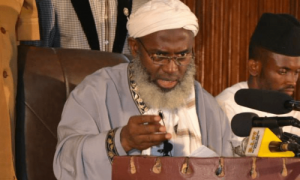Latest News
Trump’s birthright citizenship order faces first legal challenge in Seattle court

A Seattle judge will hear arguments on Thursday from four states seeking to temporarily block President Donald Trump’s executive order ending birthright citizenship in the U.S.
The states—Washington, Arizona, Illinois, and Oregon—have filed a request to pause the order while the court evaluates their legal challenge. The case marks the first judicial review of the order, signed by Trump on Monday, which seeks to deny citizenship to children born in the U.S. to parents who are undocumented or on temporary visas.
Eighteen other Democratic-led states, along with the District of Columbia and San Francisco, have filed a separate challenge.
Birthright citizenship, guaranteed by the 14th Amendment of the U.S. Constitution, automatically grants citizenship to anyone born on U.S. soil. The amendment makes it difficult to alter this right, but Trump’s order directs federal agencies to withhold citizenship documents, such as passports, for children born after February 19 who are deemed ineligible.
The lawsuit filed by the four states argues that the 14th Amendment and existing U.S. law unequivocally confer citizenship on anyone born in the country, regardless of their parents’ status. It asserts that the president lacks the authority to unilaterally amend the Constitution and warns that implementing the order would cause “immediate and irreparable harm,” rendering affected individuals undocumented, stateless, and at risk of detention or removal.
The Department of Justice (DoJ) disputes these claims, arguing that the 14th Amendment applies only to those “subject to the jurisdiction” of the U.S., which it interprets as excluding children of non-citizens unlawfully in the country. The DoJ describes the order as essential to addressing what Trump calls a “broken immigration system” and a crisis at the southern border.
According to the states’ legal filings, the executive order could affect thousands of children, with 255,000 babies born to undocumented mothers in the U.S. in 2022 alone.
Legal experts suggest that without a constitutional amendment—requiring supermajority approval in Congress and ratification by the states—the matter is likely to be decided by the courts. The hearing will be presided over by Judge John Coughenour, a Reagan appointee who has served in the Western District of Washington since 1981.
The case is also facing separate challenges, including one from the American Civil Liberties Union (ACLU). State attorneys general involved in the broader legal action, such as Connecticut’s William Tong, have stated the issue is deeply personal, emphasizing the constitutional protections at stake.
























